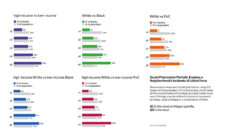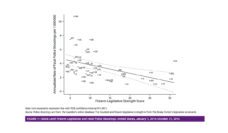In 2020 we witnessed the televised coverage of the death of George Floyd. A police officer choked Floyd to death by placing a knee on his neck for eight minutes and 46 seconds as his victim called out, “I can’t breathe.” This brutal use of force sparked global protests throughout the year; US police killed an additional 164 Blacks over the first eight months of 2020.
John Ayers and colleagues wanted to understand how Floyd’s murder shaped public interest and notions of police reform. They sought to determine public needs by looking at cumulative Google searches on police reform related topics.
The researchers retrieved searches conducted between January and July of 2020. They divided search habits by state to identify the most popular search trends. Search terms focused on police reform generally as well as specific terms pairing the word police with “training,” “union(s),” “militarization,” or “immunity.” They chose these terms to reflect common reform methods cited by experts.
Compared to the weeks prior to Floyd’s death, search results about police reform increased by 3668%, and in every state. The two most popular search queries included “training” and “unions,” followed by “immunity” and “militarization.” Southern states like Texas and Arkansas searched for police reform initiatives at a rate considerably lower than Northern states like Pennsylvania or Minnesota.
The researchers then went one step further. They compared search rates within each state to the percentage of voters supporting Donald Trump during the 2016 election. States like West Virginia, Wyoming, and Oklahoma that had higher rates of Trump votes were more likely than others to search primarily for “police unions.” These states were less likely to search for police “training” or “militarization.”
The researchers note that these results confirmed their initial assumption: increases in searches related to police reform reflects greater active interest in reform initiatives.
The researchers note that these results confirmed their initial assumption: increases in searches related to police reform reflects greater active interest in reform initiatives. They speculate that public health leaders can use this approach to target the needs of constituencies.
For example, the researchers cite The Justice Act, a police reform initiative pioneered by South Carolina Republican Senator Tim Scott. This act emphasizes training as a primary method of police reform. However, the results demonstrated that approximately 60% of Scott’s constituency actually conducted searches about police unions, compared to just 40% for police training.
The researchers further speculate that their results could be adopted to answer questions about police practices. Public health professionals could monitor Google searches to understand, in real time, where police misconduct is occurring.
Photo via Getty Images














